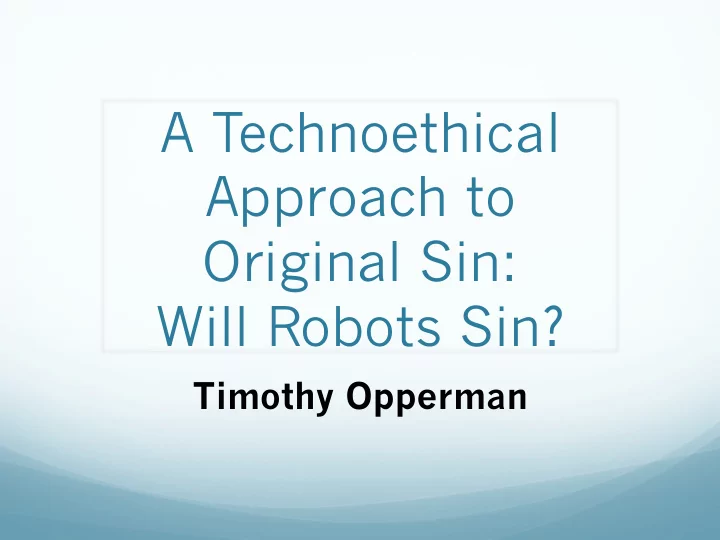

A Technoethical Approach to Original Sin: Will Robots Sin? Timothy Opperman
Uncomfortable Definitions Behaviorist - Functionalist Reductionistic Practical
Uncomfortable Definitions Autonomous – functioning without direct human input Moral – operating within the moral/ ethical sphere Agent – capable of action – for computer science, more like information processing
Uncomfortable Definitions “behaviorally indistinguishable from genuine moral agents.” - (Wallach & Allen, 58)
Uncomfortable Definitions Interactivity : Response to stimulus by change of state; that is, the agent and its environment can act on each other - Floridi & Sanders, 349
Uncomfortable Definitions Autonomy : Ability to change state without stimulus, that is, without direct response to interaction, which results in a certain degree of complexity and decoupledness from the environment - Floridi & Sanders, 349
Uncomfortable Definitions Adaptability : Ability to change the “transition rules” by which the state is changed; that is, the agent may be viewed as learning its own mode of operation in a way which depends critically on its experience - Floridi & Sanders, 349
Case Study MedEthEx – medical ethics advisor prompts interactive feedback processes data responds adaptively - Michael and Susan Anderson
Evolution of Morality Selfishness is morally neutral and ultimately necessary for survival. It is only with the advent of human conscience, within a system of morality, that selfish behavior becomes sinful.
Evolution of Morality Sin is a relational term Fracturing of relationship between us and God
Evolution of Morality Conscience evolved with consciousness Christopher Boehm Moral Origins: The Evolution of Virtue, Altruism, and Shame, 17
Evolution of Morality Conscience evolved with consciousness Biology and culture, nature through nurture, worked together to make us adaptively moral beings Christopher Boehm Moral Origins: The Evolution of Virtue, Altruism, and Shame, 17
Morality for AMAs TOP-DOWN religious ideals, moral codes, cultural values, philosophical systems Ex. The Golden Rule, Ten Commandments, Utilitarianism, Kant’s categorical imperatives, Asimov’s Three Laws of Robotics
Morality for AMAs Case Study – MedEthEx Top-Down - autonomy - beneficence - non-malfeasance
Morality for AMAs BOTTOM-UP “Creating environment where an agent explores courses of action, learns, and is rewarded for behavior that is morally praiseworthy.” - Wallach & Allen, 80
Morality for AMAs BOTTOM-UP John Holland - genetic algorithms - Alife (artificial life)
Morality for AMAs Evolutionary Robotics Genetic algorithms Success = “fitness” Programming is “recombined” Mutations added Repeat, Repeat, Repeat
Morality for AMAs Peter Danielson, UBC Centre for Applied Ethics Moral ecologies – Artificial Morality: Virtuous Robots for Virtual Games Functional morality Analogous – too simplistic
Morality for AMAs “Moral concepts surely emerge in all social beings, including, when they materialize, social machines.” - Thomas Georges, Digital Souls: Intelligent Machines and Human Values
Conclusion Will Robots Sin? - Stupid question They will, if we let them. (Top-Down) They will, when they learn from us. (Bottom-Up) It’s up to God
Recommend
More recommend